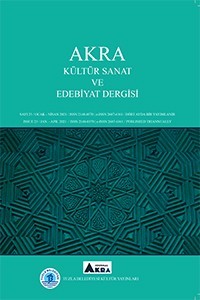Daniel Sibony’nın Marrakech Le Depart Evde Mekânsal Ayrım ve Sürgün
Marakeş, Sibony, yurt içi sürgün, diaspora, mekânsal ayrım
The Heritage (Legacy Of Wisdom) Of Turkish Culture-The Akhilic Union and On Their Contributions To The History Of Islamic Civilization
___
- Bachelard, G. 1957 : La Poétique de l’espace. Paris : Presses universitaires de France.
- Berry, J. W. (1989). Acculturation et adaptation psychologique. La recherche interculturelle, 1, 135-145.
- Brah. A. (1996) Cartographies of Diaspora: Contesting Identities. Londres, New York: Routledge.
- Collot, M. (2014). Pour une géographie littéraire. José Corti.
- Connor, W. (1986). The impact of homelands upon diasporas. Modern diasporas in inter-national politics, 16-46.
- Lefebvre, H. (2000) La Production de l’espace. Paris : Anthropos.
- Heidegger, M (1988). « Bâtir, habiter, penser. » Essais et conférences. Paris : Gallimard, 170-193.
- Said, E. W. (2008). Réflexions sur l'exil et autres essais. Actes Sud.
- Safran. W. (1997) « Diasporas in Modern Societies: Myths of Homeland and Return. » Di-aspora 1.1 (printemps 1991) : 83; Robin Cohen. Global Diasporas. Seattle : University of Washington Press.
- Sibony, D. (2009). Marrakech, le départ. Odile Jacob.
- Sibley, D. (1995 ). Geographies of exclusion: Society and difference in the West. Routledge.
- Spain, D. (1992). Gendered spaces. Univ of North Carolina Press.
- Radhakrishnan, R. (2003). Ethnicity in an Age of Diaspora (pp. 119-131). na.
- Westphal, B. (2011). La géocritique: réel, fiction, espace. Minuit.
- White, K. (1994) Le Plateau de l’Albatros. Introduction à la géopoétique. Paris : Grasset.
- Ziethen, A. (2013). Géo/Graphies postcoloniales. La poétique de l’espace dans le roman mauricien et sénégalais. Trier: WVT Wissenschaftlicher Verlag Trier.
- ISSN: 2148-0370
- Yayın Aralığı: Yılda 3 Sayı
- Başlangıç: 2013
- Yayıncı: Tuzla Belediyesi
Divan Edebiyatı Eleştirilerinin Tanzimat Edebiyatında Edebî Akımların Gelişimine Etkisi
Güçlendirici Otobiyografi: S. Morgan’in My Place’indaki Aborijin Kadin Yazarlarin Sesi
Anadolu’da Kalem İşi Süslemeye Bir Örnek: Amasya Taşova Aşağı Baraklı (Özbaraklı) Camii Mihrabı
Daniel Sibony’nın Marrakech Le Depart Evde Mekânsal Ayrım ve Sürgün
Saz Şairlerinin Korona Virüs Konulu Şiirlerinde Mizahın Kullanılması: Youtube Örneği
İstiklal Marşı’nın Kabulü ve Mehmet Akif Ersoy Temalı Posta Pulları Üzerine Bir Değerlendirme
Okçuluğun İlkeleri Umdetü’l- Mütenazilin
